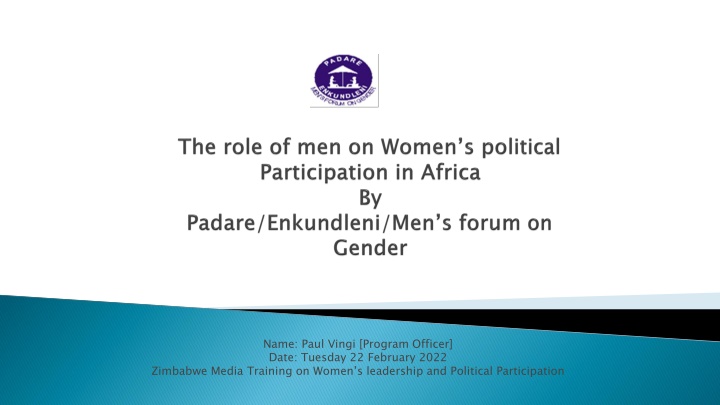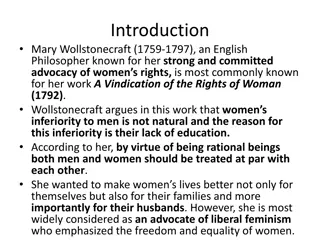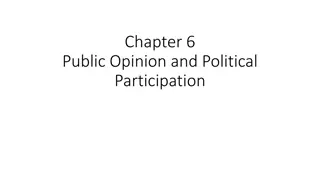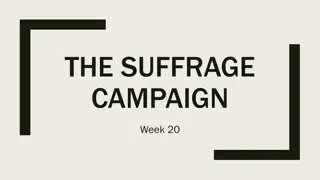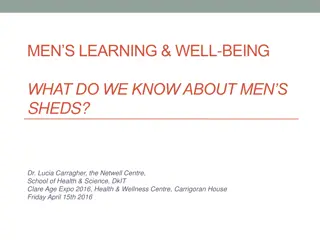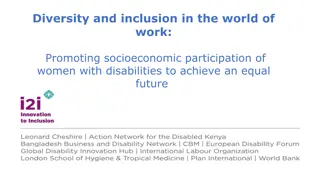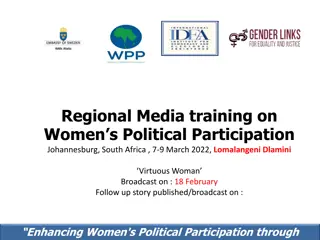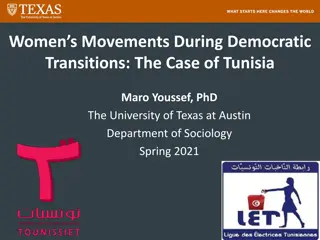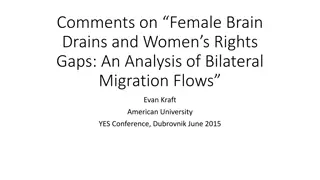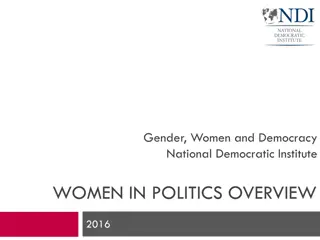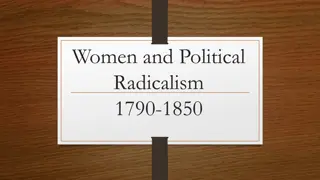Men's Role in Enhancing Women's Political Participation
Achieving gender equality is a shared responsibility that engages both men and women. Men can positively influence gender dynamics by serving as allies, supporting women's organizations, and challenging patriarchal power structures. By promoting meaningful partnerships and advocating for women's leadership, men can help dismantle barriers to political participation and combat gender-based violence.
Download Presentation

Please find below an Image/Link to download the presentation.
The content on the website is provided AS IS for your information and personal use only. It may not be sold, licensed, or shared on other websites without obtaining consent from the author.If you encounter any issues during the download, it is possible that the publisher has removed the file from their server.
You are allowed to download the files provided on this website for personal or commercial use, subject to the condition that they are used lawfully. All files are the property of their respective owners.
The content on the website is provided AS IS for your information and personal use only. It may not be sold, licensed, or shared on other websites without obtaining consent from the author.
E N D
Presentation Transcript
Name: Paul Vingi [Program Officer] Date: Tuesday 22 February 2022 Zimbabwe Media Training on Women s leadership and Political Participation
Equality between women and men is a fundamental principle of law. Achieving an end of gender inequality is a societal responsibility that must fully engage both men and women. Men have a crucial role to play as fathers, brothers, Spouses, friends, decision makers, Allies and community and opinion leaders, in speaking out on women s meaningful political participation and ensuring that priority attention is given to the issue. Importantly, men can provide positive role models for young men and boys, based on positive models of masculinity.
An ally is an individual who speaks out and stands up for a person or group that is targeted and discriminated against. An ally works to end oppression by supporting and advocating for people who are stigmatized, discriminated against or treated unfairly. Men can play a significant role as allies in helping to enhance women s political participation and in promoting gender equality at all levels. There is a cultural, faith and historical construction to women in leadership positions( give examples).
In particular it is very important for men to build meaningful and effective partnerships with women s organizations who have an intimate understanding of the issues of women s political participation, patriarchal power relations, and gender equality. The barriers to women s political participation can almost exclusively be narrowed down to two things; the fundamental condition of gender inequality for women, and the violent, harmful and controlling aspects of masculinities which are as a result of patriarchal power.(starts at family level and passed on to generations).
Work target audience for primary prevention, holders of the social norms and influencers on other men, men need to be engaged to enhance the participation of women in leadership positions, reduce and prevent gender-based violence. Work evaluation data collected, lessons are learned, and best practices are shared, which points to the engagement of men as the missing component to past decades of work on gender equality. Work the lives of women There is a much broader spectrum of positive roles for men and boys to play than being perpetrators or potential perpetrators of women oppression. Work with men and boys is necessary. with men and boys is necessary. As majority perpetrators, the Work with men and boys can be effective. with men and boys can be effective. As the evidence base grows, Work with men and boys can have a positive, transformative impact for the lives of women and girls with men and boys can have a positive, transformative impact for and girls, but also for the lives of men and boys. , but also for the lives of men and boys.
Listen and learn from women and their experiences around participation in politics. Challenge sexist language and jokes that degrade women. Get involved with in the campaigns making effort to promote gender equality (this is not an event but a process). Support aspiring women politicians. Examine how your own behaviour might contribute to women not participating in politics. Understand the roles you can play as a father, a mentor, a role model. Be an advocate for change.
Strength Based Approach Behaviour and attitude change with men is more likely when our conversations and campaigns focus on preference, hopes, and intentions as opposed to guilt, shame or fear. When we can show positive examples of equitable, nonviolent behaviour we do not isolate, or motivate men by fear, shame or guilt, encouraging more meaningful and long-term change. Strength Based Approach
Men respond better to being shown the right way to do things than being scolded about the wrong ways, and often a starting point is locating and valuing what men are already doing right, and connecting it to positive outcomes that relate to the participation of women in politics. It is important to note that this is not an excuse or substitute for NOT challenging harmful behaviors, stereotypes and myths, rather an approach that does not blame individual men for those in campaign or awareness raising tools.
One of the more promising and researched areas for men s positive roles in preventing and reducing gender- based violence hence also women s political participation is in the area of effective bystander intervention. Particularly in the context of preventing harassment to women politicians, there are several objectives: to interrupt sexist/objectifying remarks about women to prevent victim-blaming; and to interrupt male enabling behaviors.
Dr. Alan Berkowitz has identified many barriers men state for not being an active bystander: Assume that it is not a problem because others don t intervene (social influence) Fear of embarrassment (audience inhibition); Assume that someone else will do something (diffusion of responsibility) Believe that others aren t bothered by the action (social norms); and Fear of retaliation
MEN OF QUALITY ARE NOT AFRAID OF EQUALITY Thank you Tatenda Ngiyabonga Asante Sana
